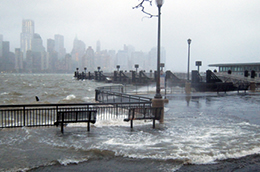| October 2013 | ||
 Print Print  Email Email |
Archive | |

| www.ibew.org |
|
 |
|

|

A massive storm whips through a region. The local utility company brings in pole inspectors, engineers or other managerial personnel from out of town to assess damage and dispatch linemen and tree trimmers to restore power. These "bird doggers," as they are known in the field, have no knowledge of the roads and landscape. They can't devise detours to evade downed trees or buildings to rapidly guide equipment to hospitals and other critical locations. As the widespread power outage drags on, a barrage of public criticism slams the utility and even the IBEW local union representing men and women who are putting their lives on the line to restore power. This scenario — too often repeated as more frequent storms torment North America — has forced leaders on both sides to ask, "Can't we do better?" In New Jersey, Michigan and Connecticut, IBEW local unions and their employers have decisively answered that question with innovative thinking and action. They are training Brotherhood wiremen — many of them unemployed — as members of emergency response teams to not only assess storm damage, but to assist utility customers — fixing damaged connections to their homes, hooking up generators, etc. These skilled union bird doggers are part of the community. They know the terrain. They have a personal interest in quick recovery from storms. In arduous battles against ice storms, derechos and hurricanes, the developing model of cooperation between IBEW's construction and utility branches marks "a glowing combination of union solidarity and community engagement," says International President Edwin D. Hill. |

|
© Copyright 2013 International Brotherhood of Electrical Workers | User Agreement and Privacy Policy | Rights and Permissions |